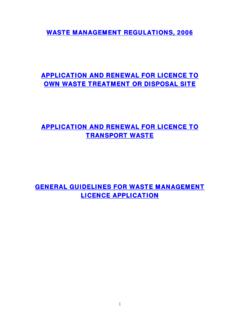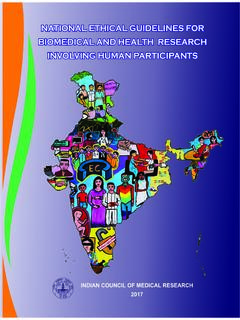Transcription of bio-medical waste management in india
1 bio-medical wastemanagement in indiaDURING COVID - 19 waste to Wealth Swapan Mehra Malyaj Varmani Sonia Duhan Ravi BeniwalStrategic Investment Research Unit (SIRU)Ankita SharmaProf K. VijayRaghavanPrincipal Scientific Adviser to the Government of IndiaForewordConsidering the rapid and relentless spread of the COVID-19 pandemic in the world, it has become pertinent to ensure a robust system of waste management . As per the WHO, the spread of the virus is not only air borne, but also can occur via surfaces, which is why, proper disposal of waste is a health and safety issue. With biomedical waste , the levels of risk are more waste is different from regular solid waste and must be treated in a different manner as well.
2 In light of the current health crisis, our country witnessed a dire need to improve segregation and disposal methods, keeping in mind the safety of those handling the waste . As the report rightly mentions, the Central Pollution Control Board (CPCB) released a set of guidelines for the appropriate management of biomedical waste in terms of segregation, treatment, as well as necessary measures for safety of healthcare and sanitation workers. The Central Pollution Control Board has also been following up with all SPCBs/PCCs to ensure effective management of biomedical waste in States/UTs. The quick response and following of important guidelines laid down by the WHO have been an impressive feat by the country s nodal agency for waste task has, understandably, not been a simple one.
3 COVID-19 applied much strain on the country s waste management infrastructure, seen even in large states such as Maharashtra and Delhi. This report brings to light the experiences of both states, and the ways in which they have tackled this mammoth task. It also outlines the various steps taken by a number of countries, such as the United States, South Korea, Germany, Indonesia, Philippines, and their efforts to manage the mounting biomedical wastes during COVID-19. This allows the reader to understand the global impact of the pandemic on waste released by the CPCB on the 10th of May 2021, indicate that biomedical waste attributed to COVID was approximately 230 tonnes per day, which is in addition to the 600 tonnes of non-COVID BMW generated every day.
4 Issues that needed to be urgently addressed included training the staff and sanitary workers to handle waste , ensuring clear communication of guidelines to households, and most importantly, making sure that guidelines were being complied report ends by identifying the gaps in our public health policy and waste management systems and calls for the improvement of citizen engagement and empowerment of informal workers, both of which are groups that can have a huge impact on the efficiency of the waste management system in the am delighted that the team at Invest india has brought this body of work that helps the reader truly grasp one of the most important, and one of the least highlighted issues during a health crisis of this magnitude.
5 This report about india s biomedical waste management during COVID-19 provides a detailed overview of india s experiences, highlighting not only the gaps in our system and infrastructure, but providing a way forward to improve these systems. The roles of the various stakeholders in the system are clearly explained, as well as the responsibilities of the citizen in being active participants in the waste management system. As india battles the scourge of the COVID-19 pandemic, we must take time to understand the diversity of frontline workers, including those who have to deal with the rising biomedical wastes. It is therefore extremely important that our waste management systems are efficient and robust enough to deal with the ongoing crisis, as well as preparing us for any similar crises in the management , and particularly harmful bio waste management , is still a challenge in most countries around the world and like in most other issues, india s situation becomes unique and more challenging owing to its large population.
6 waste management particularly becomes trickier as population rises. To target this specific condition, the Prime Minister s flagship initiatives like the Swatchch Bharat Abhiyan have been rolled out and india continues to make every effort possible to solve one of the country s most pertinent problems. Untreated biomedical waste poses a threat not just to the environment but also to the very human life that the waste was created saving. We thus have no other choice but to double down on our efforts and we choose to begin with highlighting the problem in all its details and suggesting possible solutions, all the while raising awareness especially in the medical community. We believe that in a scenario such as this, citizen s participation becomes a deciding factor in how quickly and how efficiently we are able to lift our nation out of this situation.
7 We need people of the country to compliment government s efforts and even proactively augment them. The medical community in particular, which is already very efficiently shouldering the burden of the pandemic, has to come forward to ensure that waste generated from medical institutions reaches proper treatment zones. india has always shown an excellent example of government private partnership to the world, most recently in creation home grown vaccines against the corona virus. This report also highlights the contribution of private organisations in lending their strengths for the benefit of the masses. Many young entrepreneurs from india took up this challenge and created specific solutions for the problem. With this report we hope to provide a reference point for a revolution in waste management in india .
8 By highlighting the best global practices, we hope to propel the country forward in our war against untreated waste . I thank the efforts of Invest india s teams in bringing out this report on a very real issue that requires everyone s immediate BaglaMD & CEO, Invest IndiaBIO- medical waste management IN INDIABIO- medical waste management IN INDIAA bstract Chapter- I: Introduction Defining biomedical waste Chapter-II.
9 Problem Statement A. Why is biomedical waste management (BMW) Necessary? I. Environmental Effects II. Prevents Illegal Trading of medical waste B. The Unique Challenge of the COVID-19 C.
10 Gaps in Public Health Policy I. Capacity II. Implementation III. Regulation Framework Chapter-III: Framework for biomedical waste management In india A.








